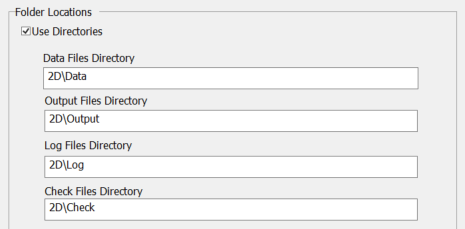XPSWMM Conversion DTM
The following sections explain how 2D data can be exported from XPSWMM and/or reconfigured into a format that is more standard of a TUFLOW model. The conversion has been summarized into three steps:
- Obtain Digital Terrain Model (DTM) dataset for TUFLOW model.
- Use TUFLOW's Processing Tool to configure the XPSWMM written TUFLOW files into a standard TUFLOW folder structure and GIS database format.
- Manual optional changes to the TUFLOW control files.
Digital Terrain Model (DTM) Data
XPSWMM reads its 2D DTM data in one of two ways:
- The DTM data can be directly specified in the '2D Model Settings', or
- The DTM data can be internally processed by XPSWMM using its terrain tools and DTM builder.
Depending which method is applied to your XPSWMM model, the steps required to convert the model to TUFLOW will vary.
Let's review what method is used:
- Open your existing model in XPSWMM.
- In the top dropdown menu options, navigate to Configuration > Job control > 2D Model Settings. This will open a dialog.
- Under '2D Hydraulics Job Control', select 'Surface & Sampling'.
- Review the options in the 'Surface' section:
- If 'Use DTM' is selected: Continue to the section below (XPSWMM DTM Preprocessing) and complete the steps.
- If 'Use Grid File for Topography' is selected and a 'Grid file' is specified: Go to the Convert XPSWMM Model to Recommended TUFLOW Structure section. The steps outlined in the 'XPSWMM DTM Preprocessing' section can be skipped.
XPSWMM DTM Preprocessing
If 'Use DTM' was selected, XPSWMM pre-processes its Digital Terrain Model (DTM) into a binary XPTIN elevation dataset for inclusion in the TUFLOW model. XPTIN is a propriety format that can't readily be used in GIS software. For this reason, the following section outlines how to obtain a DTM dataset in a GIS friendly form.
- Note: If 'Use DTM' was selected, follow the steps below. Otherwise, do not complete these steps; continue to the Convert XPSWMM Model to Recommended TUFLOW Structure section.
XPSWMM provides two options for preprocessing the DTM to be used in the TUFLOW model, both options are outlined below. As 'Option 1' is straightforward and 'Option 2' is more involved, 'Option 2' is demonstrated in the video below.
- Option 1 (recommended) - Use Original Source Elevation Data Imported to XPSWMM:
- Locate the original 'Grid' file (.asc or .flt/.hdr format). Save it to the folder where XPSWMM writes the .tcf during its simulation preprocessing. By default, this is the 2D\Data folder.
If this folder does not exist, either:- The XPSWMM model has not run, so the TUFLOW control files have not been created by XPSWMM. Run the XPSWMM model (go to Analyze > Solve... in top dropdown menu options).
- Non-default output settings have been specified in XPSWMM. To determine the output location, in the top dropdown menu options, go to Configuration > Job Control > 2D Model Settings > Folder Options. Ensure the following 'Folder Locations' are selected:
- In the top dropdown menu options, navigate to Configuration > Job Control > 2D Model Settings. This will open a dialog, under '2D Hydraulics Job Control', select 'Surface & Sampling'.
- Tick on 'Use grid file for topography' and select '...' to navigate to the Grid file saved in the 2D\Data folder. This file will be read directly into TUFLOW.
- Click 'OK' to save the settings.
- If these steps worked as expected, skip 'Option 2' and continue to the next section. Otherwise, proceed to 'Option 2'.
- Option 2 - Export DTM Data from XPSWMM:
- In the XPSWMM Layers panel, under 'Topography', right click on DTM and select 'Export DTM Data'.
- Input TIN File: Select the relevant XPSWMM Input TIN file.
- Output File Format: 'ASCII Grid File Format'.
- Cell Size Value: Choose a suitable DTM resolution. This resolution should be finer than the hydraulic model resolution. Typically, a DTM resolution is 1/10th (or smaller) of the hydraulic model 2D cell size.
- Note: XPSWMM requires an integer cell size value.
- Click 'Export'.
- Save the file to the folder where XPSWMM writes the .tcf during its simulation preprocessing. By default, this is the 2D\Data folder.
If this folder does not exist, either:- The XPSWMM model has not run, so the TUFLOW control files have not been created by XPSWMM. Run the XPSWMM model (go to Analyze > Solve... in top dropdown menu options).
- Non-default output settings have been specified in XPSWMM. To determine the output location, in the top dropdown menu options, go to Configuration > Job Control > 2D Model Settings > Folder Options. Ensure the 'Folder Locations' shown in the image above are selected.
- In the top dropdown menu options, navigate to Configuration > Job Control > 2D Model Settings. This will open a dialog, under '2D Hydraulics Job Control', select 'Surface & Sampling'.
- Tick on 'Use grid file for topography' and select '...' to navigate to the Grid file saved in the 2D\Data folder. This file will be read directly into TUFLOW.
- Click 'OK' to save the settings.
- In the top dropdown menu options, go to Analyze > Solve. This will rerun the XPSWMM model and ensure that the Grid file is recorded.
